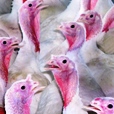
Researchers Take Aim at the Elusive Turkey Genome
An international consortium of researchers has begun an effort to sequence the genome of the domesticated turkey, Meleagris gallopavo. The genome sequence will be obtained using the Roche GS-FLX™ sequencing platform and the recently launched Roche GS FLX Titanium PicoTiterPlate device and reagents.
"The pilot phase of this project will rapidly establish a two-fold shotgun coverage of the entire turkey genome using the Roche GS-FLX™ sequencing technology at the Core Laboratory Facility at VBI," said Otto Folkerts, associate director of technology development at the Virginia Bioinformatics Institute (VBI) at Virginia Tech. "This sequence will be of immediate interest to various stakeholders and will be the starting point for our longer-term objective to sequence more than 95 percent of the turkey genome. The funding for this pilot phase was provided by the consortium members. In 2009, we plan to seek federal and industry support for the full sequencing effort."
The sequencing system permits more than 1 million individual sequencing reads to be generated for each sequencing run with an average read length of 400 base pairs, according to researchers.
The turkey genome sequence will offer considerable benefits to academic and private sector researchers interested in this commercially important source of food. According to the National Turkey Federation, turkey was the fourth most popular choice of "meat protein" for consumers in the United States in 2007. An estimated 271 million turkeys will be raised in 2008.
The genome sequence and genomic resources that will be developed from the project should provide turkey breeders with tools needed to improve commercial breeds of turkey for production traits such as meat yield and quality, health and disease resistance, fertility, and reproduction. "Having the turkey genome sequence at hand will help uncover disease-resistance and immune-related genes that can then be targeted to improve our understanding of disease development in the context of host-pathogen interactions," said Rami Dalloul, assistant professor of poultry immunology in the Department of Animal and Poultry Sciences at Virginia Tech. "Such discoveries will help direct our efforts to enhance the turkey immune competence and develop new, more effective disease-prevention strategies."
The turkey genome sequence will enable the integration of other turkey research tools and resources, such as genetic linkage and cytogenetic maps, expressed sequenced tags, predicted genes and proteins, regulatory regions, and other resources. It will also serve as a platform for development of future tools, such as high-throughput gene expression arrays and high-density genetic marker maps based on single nucleotide polymorphisms.
The assembled and annotated genome sequence will be made freely available to the global research community and will be publicly released to GenBank.